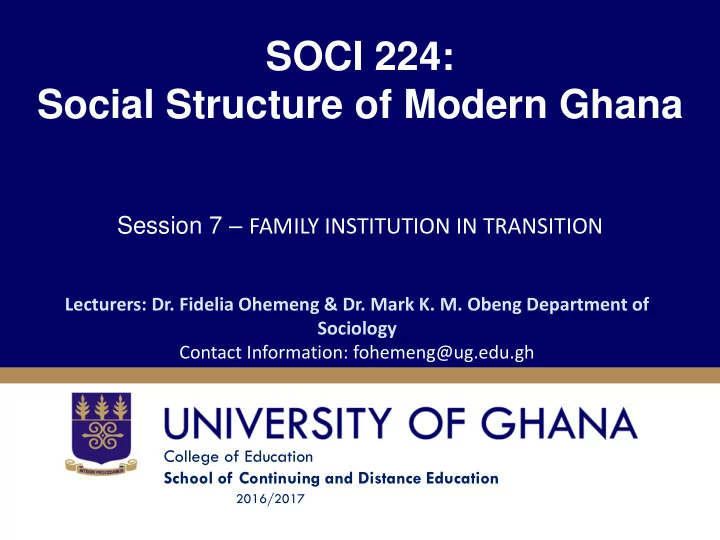

SOCI 224: Social Structure of Modern Ghana Session 7 – FAMILY INSTITUTION IN TRANSITION Lecturers: Dr. Fidelia Ohemeng & Dr. Mark K. M. Obeng Department of Sociology Contact Information: fohemeng@ug.edu.gh College of Education School of Continuing and Distance Education 2016/2017
Session Overview The family in Ghana has changed in both form and function. The secondary functions of the family have changed substantially. As well the extended family is declining, and this has implications for the Ghanaian society. The inheritance system has changed as well. Its implications would be discussed in this session. Slide 2
Session Outline The key areas to be covered in the session are as follows: • The changes that have occurred in the secondary functions of the family. • Discuss the decline in the extended family system and its implications. • Explain the introduction of PNDC law 111 and how that has impacted on the inheritance system in Ghana. Slide 3
Reading List • Nukunya, G. (2014). Tradition and Change in Ghana: an Introduction to Sociology . Accra: Ghana Universities Press. Chapter 9 Slide 4
What is Family? • A group of persons united by ties of marriage, blood, adoption, constituting a single household, interacting and communicating with each other in their respective roles as mother and father, brother and sister, husband and wife (Burges & Locke). • A social group characterized by Common Residence, Economic Corporation and Reproduction . Slide 5
Types and Composition of Family BY SIZE – Nuclear ( Couples and Children) – Extended (Nuclear and all others ) BY RESPONSIBILITY – Family of orientation – Family of procreation Slide 6
Functions of the Family Primary • Reproduction of young ones- Cardinal purpose for marriage – Sorely executed by members • Maintenance of the young during period of dependency – Determined by inheritance system • Socialization of the young- (shared) – Family and Community Responsibility • Status Ascription- – Family name /profession – Non-material in nature Slide 7
Functions Cont. Past Secondary • Political ( Abusuapanin maintains law and order) • Religious (Father as the religious head =Members are indoctrinated) • Education (Skills, social/ economic skills ) Rites of Passage. – Birth, Puberty, Marriage, Death • Marriage ( Background checks, rules – Long distance marriage, Arranged marriage, etc.) – Major stake in selection and marriage procurement • Economic – Economic Unit- – family lands/ held in trust by the Abusupayin for all members (according to needs) • Health – Engage in health seeking for sick members Slide 8
Functions of Family (Present) Primary Reproduction of young ones- • Assisted by other technology/ agencies Maintenance of the young during period of dependency: • Generally by other agencies • Time spent with children declining Weakened extended family system • Negative outlook of the extended family Socialization of the young: • Other secondary Agencies • Media • Filiocentricism* • Preference for associational ties Status Ascription: material Slide 9
Functions Cont. (Present) Secondary • Political: weakened influence of the Abusua panyin - • Religious: CHURCH • Education: little “ Efie Nyansa ” too academic/ “too much rationalization ” – Questionable vocational/domestic competencies – Grammar • Marriage : – Expanded marriage market ( Require only family consent) • Economic : Individualism (each one for himself…) • Health: Neglect and despise of folk knowledge Slide 10
Changes in inheritance and succession • Changes in inheritance and succession with the promulgation of the Intestate Succession Law PNDC law 111 – laws governing the property of an individual who dies without a will • The property is shared by a formula: – Houses and chattels go to the spouse and children – Three-sixteenth to the surviving spouse – Nine-sixteenth to the surviving child – One eighth to the surviving parent – One-eighth in accordance with customary law Slide 11
Implications • The transformation of inheritance system both in matrilineal and patrilineal societies into a uniform patrilineal society • Widows and children are able to inherit from their husbands and fathers Slide 12
Conclusion • We bear in mind the primal role of the web of kinship and the family as the main agencies of cultural transmission, and as the basic unit of social organization. The kinship system affects all individuals in society. • As human beings we are born into a family, brought up in a family, continue to live, think and act in a family and will die as members of a family. Slide 13
Recommend
More recommend